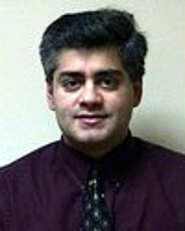
David W. Rivera, lecturer in government, presented a paper at the annual meeting of the Midwest Political Science Association held in Chicago on April 3. Titled "The Militarization of the Russian Elite under Putin: How Wide and How Deep?" and co-authored with Assistant Professor of Government Sharon Werning Rivera, the paper examined the dominant paradigm for understanding contemporary Russia, which views Russia as a "militocracy" or "neo-KGB state."
According to this paradigm, former KGB Lieutenant Colonel Vladimir Putin has methodically installed legions of fellow siloviki - individuals who spent their careers in Russia's various force structures - into important government positions as part of a plan to increase the vertical chain of authority emanating from the Kremlin and thereby bring order to a chaotic society. The paper assessed how far the militarization of the Russian elite proceeded during Putin's two terms as president by analyzing the occupational and educational backgrounds of a broad swath of prominent political, economic and societal actors in the Russian Federation.
It found that elite militarization has continued to keep pace during Putin's presidency. In particular, the proportion of siloviki in the broader elite rose steadily between 2001 and 2006, resulting in an increase of almost 25 percent. In addition, the paper found that the vast majority of elites with career experiences in the force structures have professional histories that are largely undiluted by civilian employment.
According to this paradigm, former KGB Lieutenant Colonel Vladimir Putin has methodically installed legions of fellow siloviki - individuals who spent their careers in Russia's various force structures - into important government positions as part of a plan to increase the vertical chain of authority emanating from the Kremlin and thereby bring order to a chaotic society. The paper assessed how far the militarization of the Russian elite proceeded during Putin's two terms as president by analyzing the occupational and educational backgrounds of a broad swath of prominent political, economic and societal actors in the Russian Federation.
It found that elite militarization has continued to keep pace during Putin's presidency. In particular, the proportion of siloviki in the broader elite rose steadily between 2001 and 2006, resulting in an increase of almost 25 percent. In addition, the paper found that the vast majority of elites with career experiences in the force structures have professional histories that are largely undiluted by civilian employment.
Posted April 10, 2008
